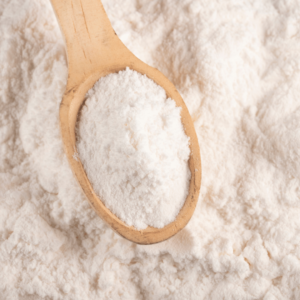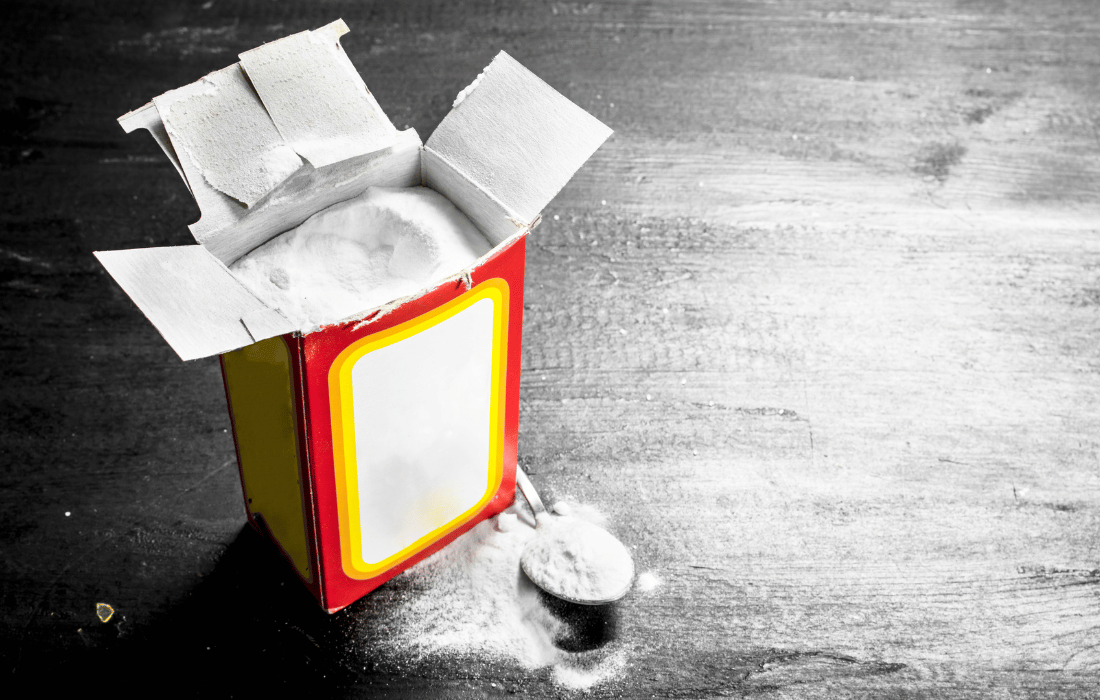When you think of performance-enhancing substances in sports, images of anabolic steroids, human growth hormones, and designer drugs likely come to mind. However, hidden in the back of many kitchen cupboards is a seemingly innocent white powder that has gained attention for its potential to boost athletic performance—baking soda. Yes, the same substance that helps your pancakes rise might also help athletes perform better in high-intensity and endurance sports.
The History and Science of Sodium Bicarbonate in Sports
Sodium bicarbonate (NaHCO3), commonly known as baking soda, acts as a buffering agent, helping to neutralize the acid produced in muscles during intense exercise. This acid buildup, primarily lactic acid, leads to muscle fatigue and decreased performance. By buffering these acids, sodium bicarbonate can delay the onset of fatigue, allowing athletes to maintain higher intensities for longer periods. After a notable study came out in 1984, athletes of all kinds were experimenting with baking soda to boost their athletic performance.
 In the 1990s, the performance-enhancing effects of baking soda were so widely acknowledged that it was classified as a “restricted technique” by the forerunners of the World Anti-Doping Agency (WADA). While an outright ban was impractical—after all, baking soda is a common kitchen ingredient—they restricted its use in large quantities specifically for enhancing athletic performance. This regulation was more symbolic than enforceable, reflecting the widespread acknowledgment of its ergogenic potential.
In the 1990s, the performance-enhancing effects of baking soda were so widely acknowledged that it was classified as a “restricted technique” by the forerunners of the World Anti-Doping Agency (WADA). While an outright ban was impractical—after all, baking soda is a common kitchen ingredient—they restricted its use in large quantities specifically for enhancing athletic performance. This regulation was more symbolic than enforceable, reflecting the widespread acknowledgment of its ergogenic potential.
Despite its benefits, the practical use of baking soda was fraught with complications, primarily due to its infamous volatility in the stomach. Overconsumption leads to gastrointestinal distress, including nausea and diarrhea. These side effects were a significant deterrent, limiting its widespread adoption despite its acknowledged benefits.
One notable anecdote highlights these practical limitations. At a conference championship, an athlete who had “soda-loaded” excessively had to withdraw from the relay due to severe gastrointestinal issues, famously known as “explosive diarrhea.” This incident underscores the delicate balance athletes had to maintain between performance enhancement and tolerable side effects.
How Sodium Bicarbonate Boosts Athletic Performance
The primary mechanism by which sodium bicarbonate enhances performance is through its buffering capacity. During high-intensity exercise, muscles produce hydrogen ions, which lower the pH of the blood and muscle, leading to acidosis and fatigue. Sodium bicarbonate, an alkaline substance, helps to neutralize these hydrogen ions, maintaining a more stable pH and delaying the onset of fatigue.
Studies have shown that sodium bicarbonate is particularly effective in improving performance in events lasting between one and ten minutes, where anaerobic metabolism predominates. This includes sports such as middle-distance running, swimming, cycling, and various team sports.
Key Studies on Sodium Bicarbonate Supplementation
University Swimmers
- Supplement: Fluid solution; 0.3 g/kg BM
- Exercise: 8 x 25 m swim
- Effect: Improved total swim time by 2% (mean difference of 4.4 seconds; p=0.04)
In this study, university-level swimmers were given a fluid solution of sodium bicarbonate before their swim trials. The results showed a significant improvement in their total swim time, with an average decrease of 4.4 seconds. This improvement, although seemingly small, can be crucial in competitive swimming where races are often decided by fractions of a second.
Well-Trained Cyclists
- Supplement: Capsule; 0.3 g/kg BM
- Exercise: HIIT cycling
- Effect: Performance enhancements when combined with caffeine (p=0.01)
The Investigative Journal of Sport Nutrition and Exercise Metabolism investigated the effects of sodium bicarbonate in well-trained cyclists performing high-intensity interval training (HIIT). The study found that when combined with caffeine, sodium bicarbonate significantly enhanced performance. This combination likely amplifies the buffering effect, allowing cyclists to push harder during their sprints.
Team Sport Players
- Supplement: Capsule; 0.3 g/kg BM
- Exercise: Repeated sprint test
- Effect: Improved performance (d=0.56)
This study focused on team sport athletes, who often perform repeated sprints during games. The results showed that a single dose of sodium bicarbonate significantly improved sprint performance. This finding is particularly relevant for sports like soccer, basketball, and rugby, where repeated high-intensity efforts are crucial.
Competitive Swimmers
- Supplement: Capsule; 0.3 g/kg BM
- Exercise: 2 x 100m swim
- Effect: Improved swimming performance by 2.4% (p<0.05)
In a study with competitive swimmers, the Journal of International Society of Sports Nutrition found that sodium bicarbonate supplementation improved performance by 2.4%. This improvement translated to a significant time reduction in the 100m swim events, highlighting the potential for sodium bicarbonate to enhance short-duration, high-intensity efforts in water sports.
Trained Cyclists
- Supplement: Capsule; 0.3 g/kg BM
- Exercise: Cycling test
- Effect: Lesser VO2 and VE decrease during the trial (p<0.01)
Another randomized controlled trial explored the effects of sodium bicarbonate on trained cyclists and found that it led to a lesser decrease in VO2 (oxygen consumption) and VE (ventilation) during cycling tests. This suggests that sodium bicarbonate can help maintain aerobic capacity during high-intensity efforts, potentially enhancing endurance and performance.
The Benefits and Risks of Sodium Bicarbonate Supplementation
While the performance benefits of sodium bicarbonate are well-documented, it is not without its risks. One of the primary concerns with sodium bicarbonate supplementation is gastrointestinal (GI) distress. Symptoms like stomach pain, bloating, and diarrhea are commonly reported, which can negate any potential performance benefits.
Gastrointestinal Issues
GI distress is a common side effect of sodium bicarbonate supplementation. This is likely due to the high sodium content and the alkalinity of the substance, which can disrupt normal digestive processes. Athletes considering sodium bicarbonate should start with smaller doses to assess tolerance and gradually increase to the recommended 0.3 g/kg BM if well tolerated.
Practical Considerations for Athletes
For athletes considering sodium bicarbonate supplementation, several practical considerations must be taken into account:
- Start with Small Doses: Begin with a lower dose to assess tolerance and gradually increase to the optimal 0.3 g/kg BM if well-tolerated.
- Timing: Experiment with timing, such as consuming the supplement 60-150 minutes before exercise.
- Combination: Consider combining sodium bicarbonate with other supplements like caffeine for enhanced effects, as seen in studies like the previously mentioned study with well-trained cyclists.
- Monitor for Side Effects: Pay close attention to any GI discomfort and adjust the dosage or discontinue use if necessary.
Chronic vs. Acute Supplementation
Chronic supplementation, where sodium bicarbonate is consumed in smaller doses over several days, has been proposed to reduce side effects and potentially enhance performance consistently. For example, one study in 2013 found that chronic supplementation enhanced performance by 8% in martial arts athletes (p<0.002). However, another study in 2012 reported no significant improvements in competitive swimmers with chronic supplementation, indicating that this approach might not be universally effective. This is why I believe it is important for athletes to have a trusted holistic health practitioner that they can work with to monitor these types of adjustments to their nutrition and training protocols.
Case Study: Sodium Bicarbonate in Elite Rowing
Canadian Exercise Physiologist Dr. Trent Stellingwerff and his team at the Canadian Sport Institute-Pacific studied the impact of individualizing sodium bicarbonate supplementation strategies on world-class rowing performance. The study, “The Impact of Individualizing Sodium Bicarbonate Supplementation Strategies on World-Class Rowing Performance,” involved elite rowers who were given sodium bicarbonate supplements with either a standard timing approach or an individualized timing based on their blood responses.
The results showed a minimal effect that individual timing was slightly better than the standard 60-minute approach. However, the study highlighted the concept that there might be a time range of opportunity, and not a set-single time to best take bicarbonate.
Dr. Stellingwerff noted that sodium bicarbonate supplementation could cause water retention in some subjects, potentially making it less beneficial for gravity-fighting athletes like runners due to acute weight gain. However, it appears to be more beneficial for non-weight-bearing sports such as cycling, rowing, and swimming.
Ethical Considerations and Future Research
The use of sodium bicarbonate as a performance-enhancing aid raises ethical questions. Dr. Ronald Deitrick, who has conducted extensive research on the subject, believes that its effects are powerful enough to be considered an artificial enhancement, violating the spirit of fair play. He argues that it should be treated similarly to other aids like creatine and banned from competition.
However, others argue that if widely available and naturally occurring substances like carbohydrates are allowed, sodium bicarbonate should not be singled out. Dr. Jonathan Folland, who conducted a study showing significant performance improvements in swimmers using sodium bicarbonate, believes it should remain legal as long as its use is transparent and ethical.
The future of sodium bicarbonate supplementation in sports will likely involve more research to refine dosage protocols and minimize side effects. Studies focusing on elite athletes, different exercise durations, and chronic vs. acute supplementation will help to clarify its role and efficacy in athletic performance.
Further Studies and Insights
To gain a comprehensive understanding of the effects of sodium bicarbonate, let’s delve into additional studies and insights.
Endurance Athletes
- Supplement: Fluid Solution; 0.3 g/kg BM
- Exercise: Endurance exercise tests
- Effect: No change in time to exhaustion but higher maximum running speed (p=0.009)
In this study, endurance athletes consumed sodium bicarbonate and participated in endurance exercise tests. The researchers found that while sodium bicarbonate did not significantly change the time to exhaustion, it did lead to a higher maximum running speed. This suggests that sodium bicarbonate may help athletes achieve higher performance levels during endurance events.
Division 1 Tennis Players
- Supplement: Fluid solution; 0.3 g/kg BM
- Exercise: Tennis match + skill test
- Effect: Decline in tennis-specific performance decreased after a match with NaHCO3 (d=1.26; p=0.004)
The Journal of the International Society of Sports Nutrition studied the effects of sodium bicarbonate on Division 1 tennis players. The results indicated that the decline in tennis-specific performance was significantly reduced after consuming sodium bicarbonate, demonstrating its potential to maintain performance levels during prolonged and intense matches.
Lightweight Rowers
- Supplement: Capsule; 0.3 g/kg BM
- Exercise: Rowing test
- Effect: Improved performance when combined with caffeine (ES: 0.6; p<0.01)
In this study, lightweight rowers were given sodium bicarbonate capsules combined with caffeine. The combination led to significant improvements in rowing performance, highlighting the synergistic effects of sodium bicarbonate and caffeine in enhancing athletic performance.
Sodium Bicarbonate and Long-Term Performance
Chronic supplementation protocols involve consuming sodium bicarbonate in smaller doses over several days or weeks before an event. This method aims to reduce the likelihood of GI distress and potentially provide more consistent performance benefits.
Competitive Wrestlers
- Supplement: Tablet; progressive regimen: 0.025–0.1 g/kg BM
- Exercise: Wingate cycling + wrestling-specific test
- Effect: Improved time-to-peak power in the second Wingate test (f2=4%; p=0.001)
A 2018 study explored the effects of chronic sodium bicarbonate supplementation in competitive wrestlers. The results showed that the progressive regimen improved time-to-peak power in the second Wingate test, indicating enhanced anaerobic performance over multiple bouts of high-intensity exercise.
Martial Arts Athletes
- Supplement: Capsule; 0.5 g/kg BM
- Exercise: Upper body Wingate test
- Effect: Serial NaHCO3 supplementation enhanced performance by 8% (ES: 1.54; p<0.002)
Another study investigated the effects of serial sodium bicarbonate supplementation in martial arts athletes. The study found an 8% improvement in performance, demonstrating the potential benefits of chronic supplementation for athletes engaging in repeated high-intensity efforts.
The Role of Sodium Bicarbonate in Modern Sports
Sodium bicarbonate’s role in modern sports continues to evolve as more research is conducted. Its potential to enhance performance, particularly in high-intensity, short-duration activities, makes it an attractive option for athletes looking for legal and effective performance aids. However, the variability in individual responses and the potential for GI distress rely on a cautious and personalized approach.
Personalized Supplementation Strategies
One of the key takeaways from recent research is the importance of personalized supplementation strategies. As seen in the study by Dr. Trent Stellingwerff, individualized timing and dosages can optimize the performance benefits of sodium bicarbonate while minimizing side effects. Athletes and coaches should work closely with sports scientists to develop tailored supplementation protocols that suit their specific needs and goals.
Integrating Sodium Bicarbonate into Training
Integrating sodium bicarbonate into an athlete’s training regimen requires careful planning and monitoring. Here are some practical steps to consider:
- Baseline Testing: Conduct baseline performance tests without supplementation to establish a performance benchmark.
- Gradual Introduction: Start with lower doses of sodium bicarbonate and gradually increase to assess tolerance and minimize GI distress.
- Timing Trials: Experiment with different timing strategies to determine the optimal ingestion window for peak performance.
- Monitor Side Effects: Keep a close eye on any GI discomfort and adjust the dosage or timing as needed.
- Combine with Other Supplements: Explore the potential synergistic effects of combining sodium bicarbonate with other supplements like caffeine, as seen in several studies.
Conclusion
Sodium bicarbonate, a common kitchen ingredient, has proven to be a powerful performance-enhancing aid for athletes. Its ability to buffer lactic acid and delay fatigue makes it particularly effective for high-intensity, short-duration sports. However, the potential for GI distress and the variability in individual responses require a personalized and cautious approach.
As research continues to evolve, athletes and coaches can refine their supplementation strategies to harness the full potential of sodium bicarbonate. By integrating this unlikely performance enhancer into their training regimens, athletes can gain a legal and effective edge in their pursuit of excellence.







